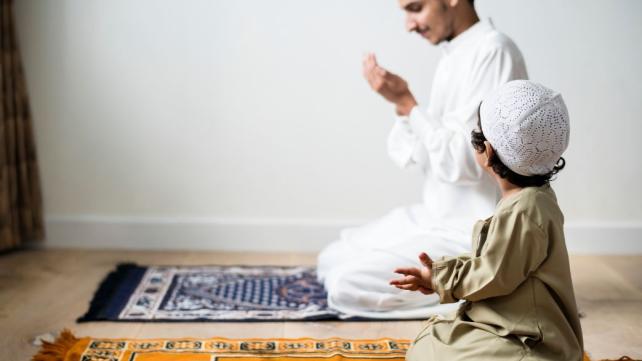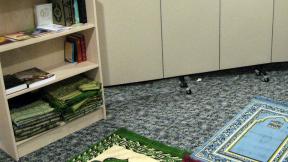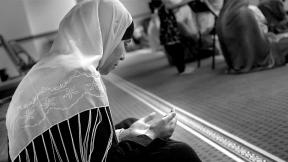
In hadith qudsi, the Prophet Muhammad (SAW) was relayed:
Allah Almighty said: My servant does not grow closer to Me with anything more beloved to Me than the duties I have imposed upon him. My servant continues to grow closer to Me with extra good works until I love him. When I love him, I am his hearing with which he hears, his seeing with which he sees, his hand with which he strikes, and his foot with which he walks. Were he to ask something from Me, I would surely give it to him. Were he to ask Me for refuge, I would surely grant it to him.
al-Bukhārī, Ṣaḥīḥ al-Bukhārī, 8:105 #6502.
This hadith is known as the "Hadith of the Friend (al-Wali)," . It describes the behavior of performing obligatory and voluntary actions that Muslims should adopt as they seek to gain the pleasure of Allah. The goal of every Muslim family is to draw close to Allah through strong iman and sincere submission. This hadith emphasizes the importance of fulfilling our obligations or consistently performing obligatory acts of ibadah along with ‘hasanat’ – good deeds.
Obligatory Acts
When we look to the Quran, Allah guides mankind to understand the very basic actions of a Muslim when Prophet Luqman (AS) gives his son the most excellent wisdom
"O my son, establish prayer, enjoin what is right, forbid what is wrong, and be patient over what befalls you"
Suratul Luqman 31:17
Within the Muslim household the establishment of prayer is a must. Prayer is an obligatory act in Islam, one of the basic five principles and perhaps the most significant action that exists in the Muslim household. Establishing prayer within the household as a consistent activity is crucial in helping and reinforcing Taqwa and Iman and developing akhlaq as an essential part of each person’s personality because family members are reminded to be every conscious of their Lord.
When there is a committed and consistent effort to make prayer a priority in the household, the prayer becomes natural, normal, anticipated and appreciated within the home. This helps to grow and foster a strong Muslim identity with the children and family members. A family who stops and prays at the appointed time reminds and teaches that there is nothing more important that Allah and our submission to Him. Prayer is an easy action to perform consistently by its very nature and all members of the family and stages of family development.
- New husbands/fathers – lead the prayer
- New wives/mothers – teach children how to pray, remind the family of prayer time, set up prayer areas in home
- Children/Teens – can make the adhan, lead the prayers, prepare prayer area
- Seniors – grandparents or older extended family members – lead prayer, teach prayer, offer tafsir,
- Babies/toddlers – listen and observe the prayer as a natural activity within the household
Prayer creates a strong bond for the family and helps to instill love for Allah in the hearts of each family member. Performing prayer in a consistent manner fosters good feelings between each other during this crucial time of obedience. When families make prayer together they share sincere and powerful experience.
- Humility – a state of khushoo in salah where there is a sincere focus on Allah. This is an individual experience that is enhanced by seeking and achieving through the shared experience of making salah together as a family.
- Iman – the act of prayer increases the faith because it is through prayer that we call on Allah for guidance and seek forgiveness.
- Remembrance – the act of prayer is a reminder of the power and glory of Allah. The human being learns and internalizes repeated acts and the repetition of remembrance of Allah becomes instilled in the hearts of the believer.
A Muslim family that prays together develops shared values of Islamic concepts. In the “Hadith of the Friend”, we also learn the importance of involuntary acts. Doing hasanat – or doing good deeds is a natural outgrowth from the peace, commitment, tranquility and desire to please Allah that envelopes the spirit of the supplicant after making prayer.
Prayer is part of the daily life and structure of a Muslim. Because prayer times come throughout the day, family members develop the discipline to leave off the cares and pressures of the world and reflect for a few moments on Allah. This reflection can serve as a protection from sin and increase the desire to do good deeds.
In Islam, the good deeds that are performed are rooted in akhlaq, which is a person’s essential nature or characters. This natural disposition is enhanced by the consistency of prayer and involves conscious effort to practice the good attributes of strong ethics and morality. These qualities are part of the inner nature of the human being and reflected in the outward action of performing good deeds.
Good deeds help the smooth operation within the Muslim Home. Families should be deliberate in recognizing that good deeds involve more than helping the poor, volunteering or giving sadaqah. There are good deeds and actions that family members can do within the home that when done consistently bring about harmony and connectedness.
Examples of consistent good deeds within the Muslim household
- Sharing – games, toys, books, clothing, time
- Shuraa – discussing and agreeing on entertainment, events, chore distribution etc
- Honesty – truthfully acknowledging mistakes like losing or breaking something
- Accountability – fulfilling shared household chores, meeting expectations
- Compassion – helping each other in chores, study or new challenges
- Patience – waiting, taking turns,
- Encouragement – speaking kindly to each other, greeting, paying attention
- Respect – respecting each others space, possession, time and efforts
- Prayer – family members should remember to pray for each other
“And those who believe and whose descendants follow them in faith - We will join with them their descendants, and We will not deprive them of [anything] of their deeds"
Surah At-Tur 52:21
Author bio: Mahasin D. Shamsid-Deen is the news curator and content manager for Muslim Network TV (MNTV) and contributing writer for Sound Vision. She holds a master’s degree in English writing and has worked as both a High School and College ESL Instructor and Writing Instructor for more than a decade. Mahasin has numerous published articles, books, essays and is a published playwright with three award winning stage plays. She is currently writing her dissertation for her doctoral degree.







Add new comment